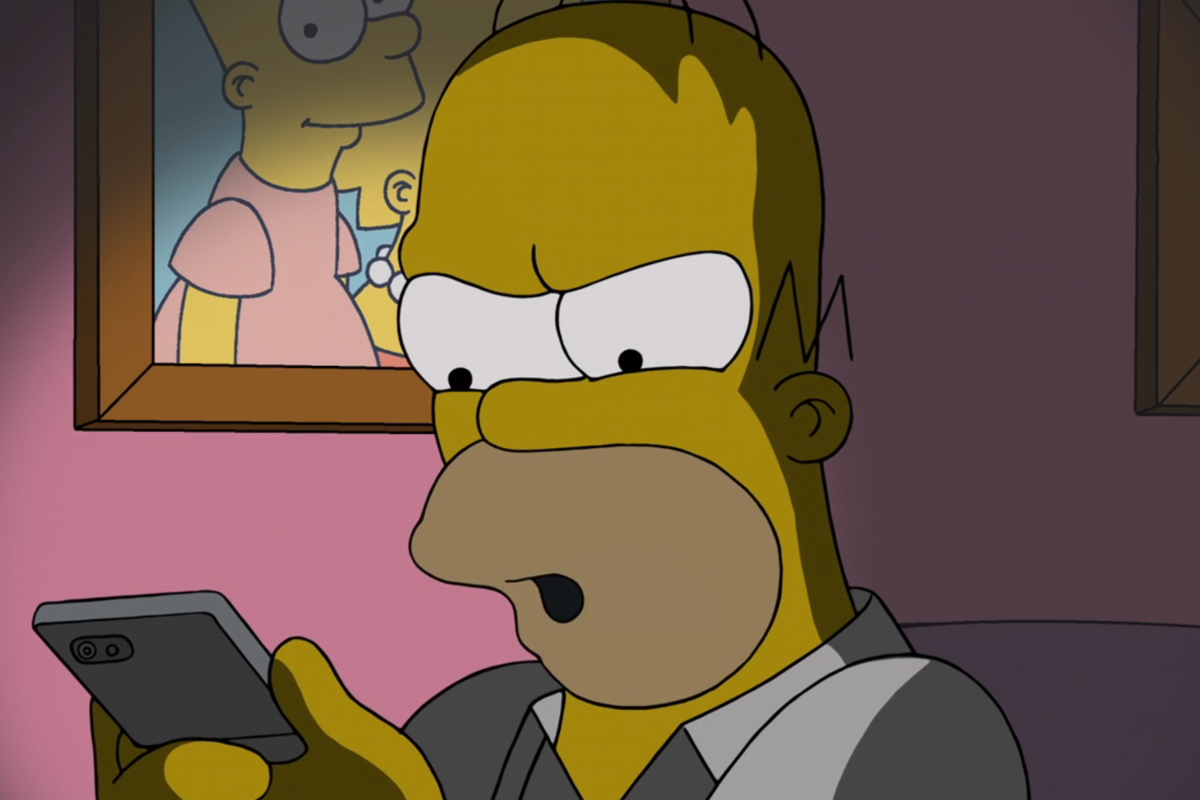Tonight, the longest-running sitcom in American history returns. But does anybody care? After 36 seasons (soon to be 37), 36 years, and nearly 800 episodes, The Simpsons has transformed from a global phenomenon to a (yellow) part of the cultural wallpaper. Today, the seminal animated sitcom is mostly discussed by nostalgic obsessives rerunning the show’s “golden era”, or else in TikTok videos and lighthearted news articles discussing some uncanny cultural “prediction” from a bygone episode – be that the election of US President Donald Trump, the Ebola virus outbreak or Germany winning the World Cup.
Many believe the show has declined in quality, and it’s true that recent episodes don’t live up to the seven-odd years of the “golden era”. But then again, what does? As Homer Simpson himself quips: “Everyone knows rock attained perfection in 1974. It’s a scientific fact.”
If the show does struggle to make an impact now, it only has its own success to blame. After all, The Simpsons hasn’t so much predicted modern times as it has shaped them – and shaped how we interact with them.
American journalist Alan Siegel has charted the story of The Simpsons’ rise in a new book, Stupid TV, Be More Funny: How the Golden Era of The Simpsons Changed TV and America Forever. For him, as he states within the book’s introduction, the series was nothing short of revolutionary. “It was so radically different from everything else on TV that it hooked us,” he writes. “It wormed its way into our collective consciousness, influencing American culture in ways that nothing ever has.”
The Simpsons is rarely discussed as a spinoff, but it technically qualifies as one – it started its life as a series of shorts on The Tracey Ullman Show in 1987, before launching as its own series two years later. Its initial team was a ragtag bunch of animators and sitcom writers, armed with grievances over the tired conventions of US television. Experienced bigwig James L Brooks, sitcom maven Sam Simon (Taxi; Cheers),underground American cartoonist Matt Groening, Saturday Night Live tearaway George Meyer, and the enigmatic curmudgeon John Swartzwelder were among the cohort. The show was taken on by Fox – then a new, fledgling network – but no one involved thought they were embarking on a project that would span more than a few years. Let alone four decades.
On paper, The Simpsons was one more family sitcom in an era when television was teeming with them. It would have been no revolutionary feat, were it not for a few things. Firstly, it was animated, which opened up a world of potential for visual humour – just about anything the team could dream up from their soda-encrusted writers’ room, dubbed the “Simpsons Motel” at Fox’s studios in Los Angeles. TV animation was historically a medium aimed at children, and in transposing a more adult-themed sitcom to the artform, it charted new and fertile comic territory. Many of the immediately famous moments from these early seasons – such as Homer trying to jump Springfield Gorge on a skateboard, you wouldn’t see that in The Cosby Show – were only feasible in the medium of animation. “The writers knew the tropes of traditional sitcoms, and they wanted to blow them up,” Siegel says.

Then there was the show’s rebellious streak – fuelled by a naivety surrounding the show. The writers sincerely thought it’d be a short gig. “We’re 13 [episodes] and out,” early and integral showrunner Sam Simon told the team in its first season. They were also armed with a greenlight from the Fox execs that they wouldn’t interfere with storylines or jokes – carte blanche that most modern shows can only dream about.
This freedom was embodied in Bart, who emerged as the main character for those earliest seasons. In an era of Urkels and Cosbys, Bart was a true rebel and a perfect distillation of MTV-era youth. His rebellious nature even struck fear into the heart of the American government – George Bush Sr’s drug czar had choice words about the “little spikehead” in 1990, and federal agents even scored millions of dollars worth of bootleg Bart Simpson merch in a series of raids. The show rode “Bartmania” in those early days, before settling into a more family and society-oriented story structure.
As refreshing as this anti-authoritarian streak was, Siegel’s book shows us where it might have come from. The roots of it can be seen in creator Matt Groening’s subversive comic strip, Life in Hell – an eccentrically subversive publication showing the hijinx of rabbits Binky and Bongo and a gay couple who wear fezzes.

Watch Apple TV+ free for 7 day
New subscribers only. £9.99/mo. after free trial. Plan auto-renews until cancelled.
Try for free
ADVERTISEMENT. If you sign up to this service we will earn commission. This revenue helps to fund journalism across The Independent.

Watch Apple TV+ free for 7 day
New subscribers only. £9.99/mo. after free trial. Plan auto-renews until cancelled.
Try for free
ADVERTISEMENT. If you sign up to this service we will earn commission. This revenue helps to fund journalism across The Independent.

But the show was also shaped by unexpected antecedents. Beloved comedian and golden-era Simpsons writer Conan O’Brien highlights Adam West’s campy 1960s Batman series. It’s cringe-inducing by today’s standards, but the writers found that, behind the “Pow!” and “Biff!”, there was something interesting at play in characters such as Commissioner Gordon, Gotham’s own Police Chief Wiggum. Moving past pure rebellion, Siegel pinpoints the episode “Homer’s Phobia” as the one where he first cottoned on to the show’s sociological nuance. The episode, which featured a guest appearance from John Waters, skewers homophobia and features Springfield’s gay steel mill-turned nightclub.
Julie Prescott, writer of a later Halloween episode and co-host of a now-completed popular podcast series, Round Springfield, points to a seventh-season episode in which Marge, the family’s matriarch, falls in with a country club crowd. “Framing that story around Marge rather than Bart and Lisa was a welcome twist,” she says, allowing for class-divide commentary rather than simple playground politics.
Allie Goertz, her podcast co-host and former editor of MAD magazine, mentions “Lisa the Iconoclast”, an exploration of historical revisionism through the lens of hometown “hero” Jebediah Springfield. Episodes like these showed audiences that there were jokes to be found within the serious folds of serious issues. “To me, those early episodes that were ahead of their time are much more impressive than the single gotcha moments,” he says.
A good chunk of the credit for the show’s comedic nous and esoteric references must go to the hermetic writer John Swartzwelder, whom Siegel refers to as “comedy writing’s Paul Bunyan”. Much ink has been spilt over Swartzwelder’s enigmatic nature, his infamous rant about the sorry state of TV during a job interview with David Letterman, and his steadfast refusal to be interviewed or photographed. There was an agonising team behind many of the most loved jokes, but it’s fair to say Homer is at his Homerest when the cantankerous Swartzwelder wields the pen: “So [you’re] a graduate student huh? How come you guys can go to the moon but you can’t make my shoes smell good?”
Fellow writer George Meyer described Swartzwelder’s best jokes as the “horrifying” contrasted by the “banal” – a forebearer of much of the humour found online today, shared through memes. When something terrible happens (say, a global pandemic), it’s not long before your social media fills with images and videos you might describe as Swartzweldian – a reaction to events with some detached satirical approach. It’s a part of how we comprehend the often horrific world around us.

As well as being a clear precursor to (and influence on) modern internet humour, The Simpsons was also a harbinger of one the web’s less amusing sides – vicious online debates about pop culture. As Siegel details in his book, an early Simpsons forum called alt.tv.simpsons became a popular place to discuss – and often trash – the show in the 1990s. “It was one of the best shows in the history of TV. And yet people were saying it’s going in the toilet,” Siegel laughs. “When you put people in an online space with anonymity, they are going to get angry. Talk about prescience.”
As the years went by, The Simpsons went from must-see watercooler television to comfort watch, to guilty pleasure, before settling now into a state of simply “being on”. Celebrity guest stars – once a pioneering strength of the show, with great early-season turns from people such as Dustin Hoffman and Rodney Dangerfield – became overused and slapdash as the show grew older. A writing style aimed at mainstream younger audiences dulled the immaculate glow the show once had. The switch from animated cels to digitised method after season 12 stole the show’s literal glow, replacing it with a cold facsimile.
Even now, though, The Simpsons is at no risk of falling into obscurity. Puffed-up “predictions” may be what grabs the headlines, but the truth is that The Simpsons achieved a more difficult task – understanding its own present, and therefore securing the show’s future for many years. There are yellow, four-fingered prints all over our world. “It transcended everything before it,” Siegel says. “There aren’t too many times you can achieve that.”
‘Stupid TV, Be More Funny: How the Golden Era of The Simpsons Changed TV and America Forever’ by Alan Siegel is out now, published by Little, Brown & Company; ‘The Simpsons’ is available to stream in the UK on Disney+




